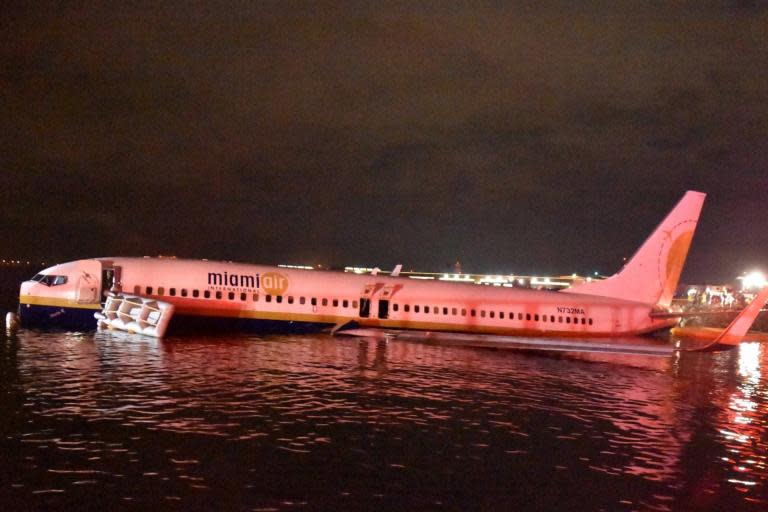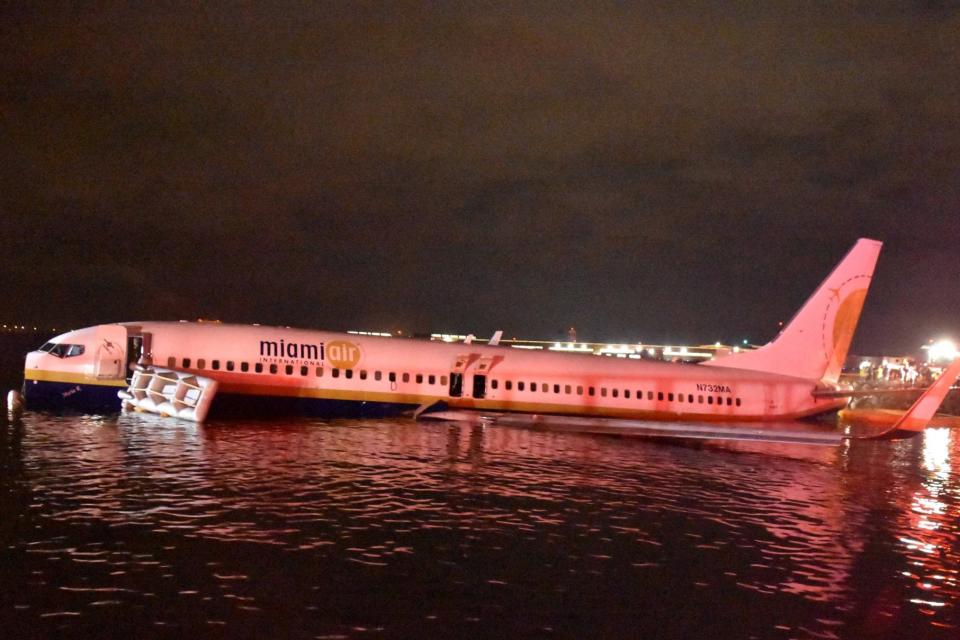Boeing 737: Passengers recount terrifying landing after plane crashes into Florida river
For Darwing Silva, the first sign that something was amiss when his flight landed in Jacksonville, Florida, during a thunderstorm was that it seemed the jet did not brake after hitting the runway.
Lights zoomed by the window. He traded worried glances with other passengers.
Then came the jolt.
“It was just the biggest impact I’ve ever felt in my life,” Mr Silva said. “Like an explosion, almost.”
He lurched forward in his seat — 14B, the middle seat in an exit row — and hit his head on the seatback in front of him.
Seconds later, Mr Silva felt water. “Up to my ankles,” he said. “And there was water coming in from above the roof of the plane.”
The Boeing 737 had slid off the runway of the naval air station in Jacksonville and into the shallow waters of the St Johns River.
All 136 passengers and seven crew members would be rescued, 21 of them with non-life-threatening injuries. But all Mr Silva knew at the time was that the flight, which had taken off from Guantánamo Bay, Cuba, had landed in water — and that someone was yelling something about smelling jet fuel.
“I just kind of snapped” into action, said Mr Silva, a civilian safety manager for a roofing company.
He grabbed his backpack, which was hanging from an overhead bin that had popped open during the accident. He slipped past the female passenger in the window seat, who was bracing her head between her knees, opened the exit door, and found himself on a wing of the plane.
Others began filing onto the wing, amid the darkness, rain and lightning. Mr Silva called his father to let him know he was OK. Eventually, the passengers made it onto an evacuation raft, children and women first, and emergency workers used a cable to guide them ashore.
“I’ve gone over so many of those safety instructions preflight,” Mr Silva said. “You never really think you’re going to be the one to have to open the door.”
His trip seemed cursed from the start. The charter plane, operated by Miami Air International, had arrived four hours late. The flight had been unbearably hot, said Cheryl Bormann, one of the Jacksonville passengers, and people had to fan themselves because the air conditioning was not working properly. Mr Silva had taken off his polo shirt and was sweltering in his undershirt.
As the flight neared Jacksonville, the plane flew into a storm. There was some turbulence, but the crew gave no warnings about potential landing trouble.
It felt as if the front part of the plane had hit the ground hard before the rest of it had, Ms Bormann said.
“It bounces and it swirls and it tilts and it tips, and you can tell the pilot is trying to control it and is not having much success,” she said. “It’s literally bouncing up and down, from side to side. Things are falling down from the overhead bins. People are holding onto their small children.”
Miami Air International regularly transports military service members and their families from the base in Guantánamo Bay to naval air stations in Jacksonville and Norfolk, Virginia.
Officials for the carrier did not return phone calls on Saturday about the accident.
The mishap stranded about 125 passengers at Guantánamo on Saturday morning. They were awaiting the return of the Miami Air plane for a flight to Andrews Air Force Base in Maryland.
The stranded group included a military judge who announced this week that he would no longer preside over the case against Khalid Sheikh Mohammed and four other men accused of plotting the September 11 attacks.
Also among them were two brigadier generals, prosecutors, defence lawyers and journalists who had arrived a week earlier for a pretrial hearing in the case.
Mr Silva said he had driven straight from the naval station to his home in Miami, arriving about 5:30 am.
“I feel my neck sore. My right eye is sore,” he said. “I am going to get checked out just to make sure everything is OK, but at that moment, I didn’t feel much. The adrenaline, I guess.”
Ms Bormann, a civilian criminal defence attorney in the 9/11 trial, spent the day scrambling to get a change of clothes, a new phone and enough forms of ID to get on a flight home to Chicago. Her few remaining belongings were in a reusable grocery bag that she was now using as a purse.
“I’m a criminal defence lawyer who handles capital cases — trauma is something I’m pretty accustomed to,” she said. “But you don’t realise it until it hits you. I sat on my bed and cried this morning in my hotel room. I have to get on a plane tomorrow. And I’m not looking forward to it.”
The New York Times


